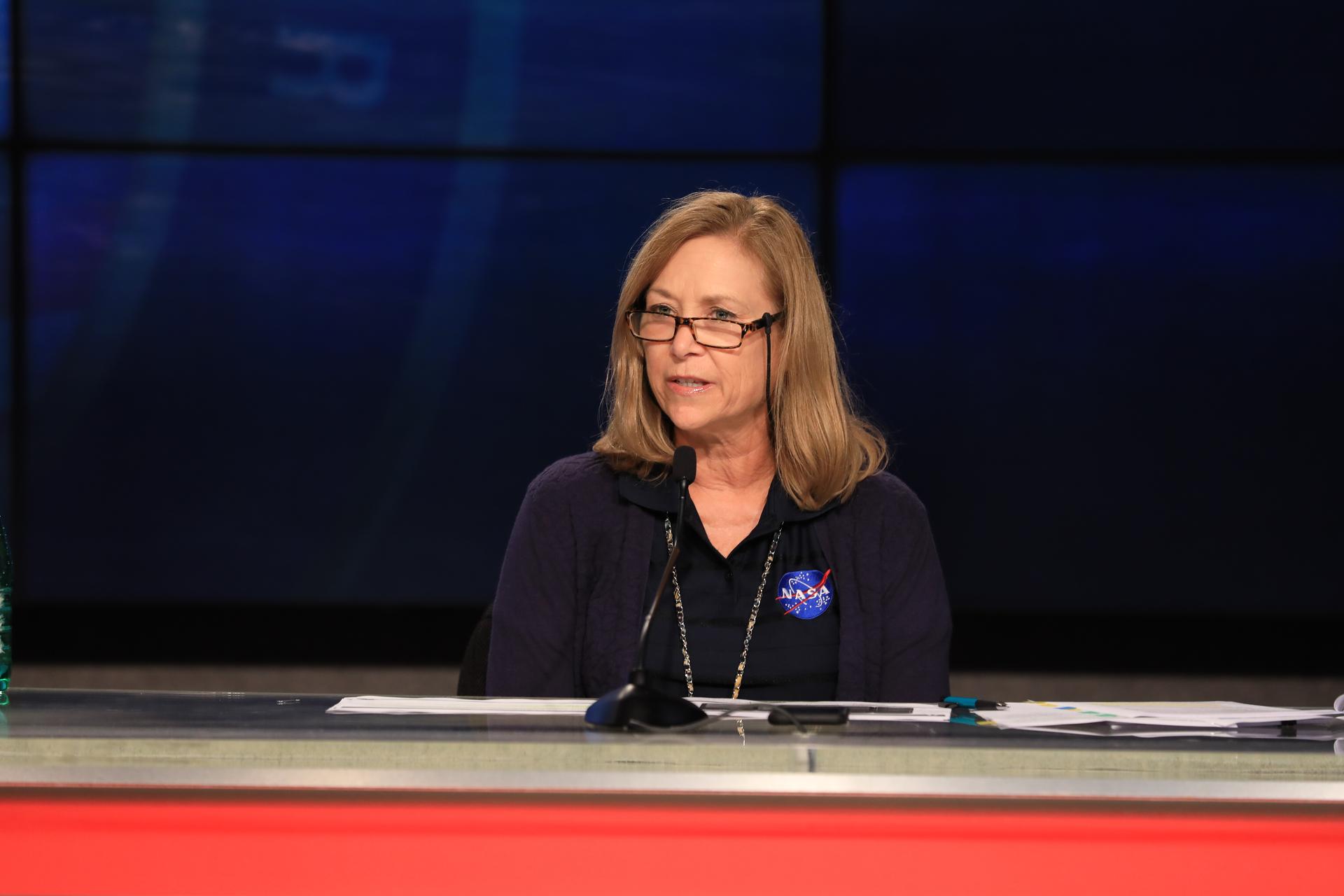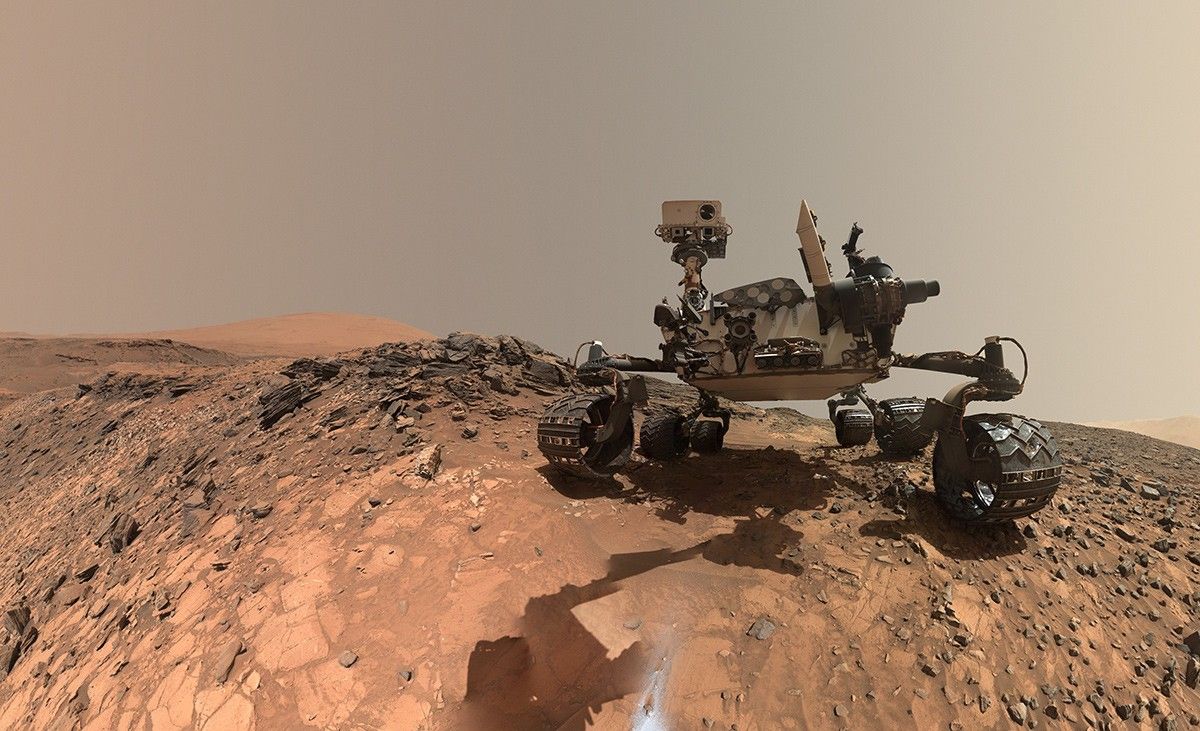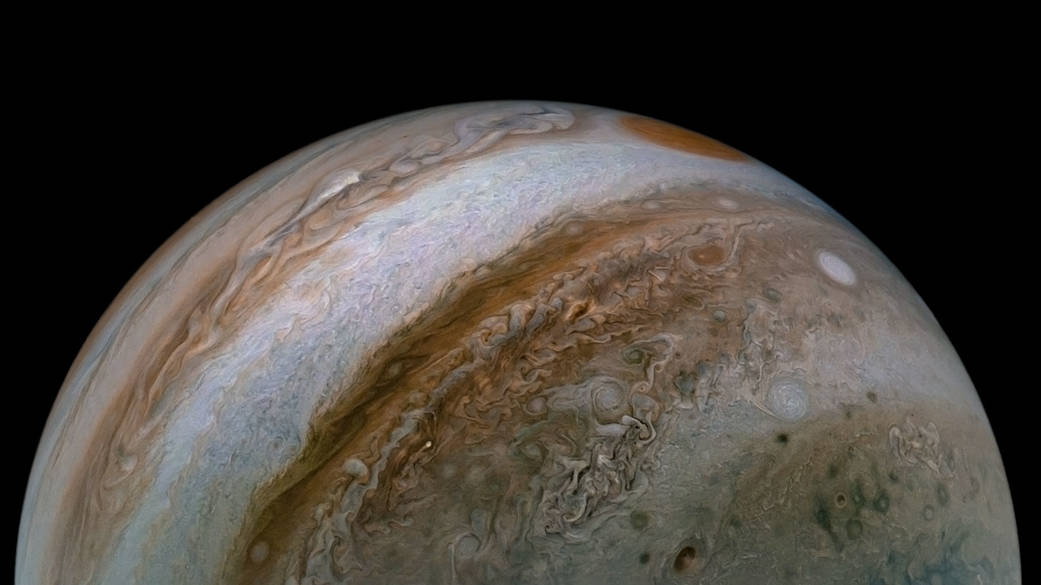A Trump appointee suggests NASA may not have a new administrator until next year.
NASA press secretary Bethany Stevens, acting administrator Janet Petro, chief of staff Brian Hughes, associate administrator Vanessa Wyche, and deputy associate administrator Casey Swails held a town hall with NASA employees Wednesday. Credit: NASA
The four people at the helm of America's space agency held a town hall meeting with employees Wednesday, fielding questions about downsizing, layoffs, and proposed budget cuts that threaten to undermine NASA's mission and prestige.
Janet Petro, NASA's acting administrator, addressed questions from an auditorium at NASA Headquarters in Washington. She was joined by Brian Hughes, the agency's chief of staff, a political appointee who was formerly a Florida-based consultant active in city politics and in Donald Trump's 2024 presidential campaign. Two other senior career managers, Vanessa Wyche and Casey Swails, were also on the stage.
They tried to put a positive spin on the situation at NASA. Petro, Wyche, and Swails are civil servants, not Trump loyalists. None of them looked like they wanted to be there. The town hall was not publicized outside of NASA ahead of time, but live video of the event was available—unadvertised—on an obscure NASA streaming website. The video has since been removed.
8 percent down
NASA's employees are feeling the pain after the White House proposed a budget cut of nearly 25 percent in fiscal year 2026, which begins October 1. The budget request would slash NASA's topline budget by nearly 25 percent, from $24.8 billion to $18.8 billion. Adjusted for inflation, this would be the smallest NASA budget since 1961, when the first American launched into space.
"The NASA brand is really strong still, and we have a lot of exciting missions ahead of us," Petro said. "So, I know it's a hard time that we're going to be navigating, but again, you have my commitment that I'm here and I will share all of the information that I have when I get it."
It's true that NASA employees, along with industry officials and scientists who regularly work with the agency, are navigating through what would most generously be described as a period of great uncertainty. The perception among NASA's workforce is far darker. "NASA is f---ed," one current leader in the agency told Ars a few weeks ago, soon after President Trump rescinded his nomination of billionaire businessman and commercial astronaut Jared Isaacman to be the agency's next administrator.

Janet Petro, NASA's acting administrator, is seen in 2020 at Kennedy Space Center in Florida. Credit: NASA/Kim Shiflett
Before the White House released its detailed budget proposal in May, NASA and other federal agencies were already scrambling to respond to the Trump administration's directives to shrink the size of the government. While NASA escaped the mass layoffs of probationary employees that affected other departments, the space agency offered buyouts and incentives for civil servants to retire early or voluntarily leave their posts.
About 900 NASA employees signed up for the first round of the government's "deferred resignation" program. Casey Swails, NASA's deputy associate administrator, said Wednesday that number is now up to 1,500 after NASA announced another chance for employees to take the government's deferred resignation offer. This represents about 8 percent of NASA's workforce, and the window for employees to apply runs until July 25.
One takeaway from Wednesday's town hall is that at least some NASA leaders want to motivate more employees to resign voluntarily. Hughes said a "major reason" for luring workers to leave the agency is to avoid "being in a spot where we have to do the involuntary options."
Rumors of these more significant layoffs, or reductions in force, have hung over NASA for several months. If that happens, workers may not get the incentives the government is offering today to those who leave the agency on their own. Swails said NASA isn't currently planning any such layoff, although she left the door open for the situation to change: "We're doing everything we can to avoid going down that path."
Ultimately, it will depend on how many employees NASA can get to resign on their own. If it's not enough, layoffs may still be an option.
Many questions, few answers
Nearly all of the questions employees addressed to NASA leadership Wednesday were submitted anonymously, and in writing: When might Trump nominate someone for NASA administrator to take Isaacman's place? Will any of NASA's 10 field centers be closed? What is NASA going to do about Trump's budget proposal, particularly its impact on science missions?
Their responses to these questions, in order: Probably not any time soon, maybe, and nothing.
The Trump administration selected Petro, an engineer and former Army helicopter pilot, to become acting head of NASA on Inauguration Day in January. Bill Nelson, who served as a Florida senator until 2019, resigned the NASA administrator job when former President Biden left the White House.
Petro was previously director of NASA's Kennedy Space Center since 2021, and before that, she was deputy director of the Florida spaceport for 14 years. She leapfrogged NASA's top civil servant, associate administrator Jim Free, to become acting administrator in January. Free retired from the agency in February. Before the presidential election last year, Free advocated for the next administration to stay the course with NASA's Artemis program.
But that's not what the Trump administration wants to do. The White House seeks to cancel the Space Launch System rocket and Orion spacecraft, both core elements of the Artemis program to return astronauts to the Moon after two more flights. Under the new plan, NASA would procure commercial transportation to ferry crews to the Moon and Mars in a similar way to how the agency buys rides for its astronauts to the International Space Station in low-Earth orbit.

NASA's Curiosity rover captured images to create this selfie mosaic on the surface of Mars in 2015. If implemented as written, the Trump budget proposal would mark the first time in 30 years that NASA does not have a Mars lander in development. The agency would instead turn to commercial companies to demonstrate they can deliver payloads, and eventually humans, to the red planet.
The Trump administration's statements on space policy have emphasized the longer-term goal of human missions to Mars. The White House's plans for what NASA will do at the Moon after the Artemis program's first landing are still undefined.
Petro has kept a low profile since becoming NASA's temporary chief executive five months ago. If Trump moved forward with Isaacman's nomination, he would likely be NASA administrator today. The Senate was a few days away from confirming Isaacman when Trump pulled his nomination, apparently for political reasons. The White House withdrew the nomination the day after Elon Musk, who backed Isaacman to take the top job at NASA, left the Trump administration.
Who’s running NASA?
Now, Petro could serve out the year as NASA's acting administrator. Petro is well-regarded at Kennedy Space Center, where she was a fixture in the center's headquarters building for nearly 20 years. But she lacks a political constituency in the Trump administration and isn't empowered to make major policy decisions. The budget cuts proposed for NASA came from the White House's Office of Management and Budget, not from within the agency itself.
President Trump has the reins on the process to select the next NASA administrator. Trump named Isaacman for the office in December, more than a month before his inauguration, and the earliest any incoming president has nominated a NASA administrator. Musk had close ties to Trump then, and a human mission to Mars got a mention in Trump's inauguration speech.
But space issues seem to have fallen far down Trump's list of priorities. Hughes, who got his job at NASA in part due to his political connections, suggested it might be a while before Trump gets around to selecting another NASA administrator nominee.
"I think the best guess would tell you that it's hard to imagine it happening before the next six months, and could perhaps go longer than that into the eight- or nine-month range, but that's purely speculation," Hughes said, foreseeing impediments such as the large number of other pending nominations for posts across the federal government and high-priority negotiations with Congress over the federal budget.
Congress is also expected to go on recess in August, so the earliest a NASA nominee might get a confirmation hearing is this fall. Then, the Senate must vote to confirm the nominee before they can take office.
The timeline of Isaacman's nomination for NASA administrator is instructive. Trump nominated Isaacman in December, and his confirmation hearing was in April. He was on the cusp of a confirmation vote in early June when Trump withdrew his nomination May 31.
As NASA awaits a leader with political backing, Petro said the agency is undergoing an overhaul to make it "leaner and more agile." This is likely to result in office closures, and Hughes indicated NASA might end up shuttering entire field centers.
"To the specific question, will they be closed or consolidated? I don't think we're there yet to answer that question, but it is actively a part of the conversation we're having as we go step-by-step through this," Hughes said.
What can $4 billion buy you?
While Trump's budget proposal includes robust funding for human space exploration, it's a different story for most of the rest of NASA. The agency's science budget would be cut in half to approximately $3.9 billion. NASA's technology development division would also be reduced by 50 percent.
If the White House gets its way, NASA would scale back research on the International Space Station and cancel numerous robotic missions in development or already in space. The agency would terminate missions currently exploring Jupiter, on the way to study an asteroid, and approaching interstellar space. It would shut down the largest X-ray space telescope ever built and the only one in its class likely to be operating for the next 10 years.
"There's a lot of science that can still be done with $4 billion," Petro said. "How we do science, and how we do partnerships, may change in the future to sort of multiply what we're doing."
These partnerships might include asking academic institutions or wealthy benefactors to pitch in money to fund science projects at NASA. The agency might also invite commercial companies to play bigger roles in NASA robotic missions, which are typically owned by the government.

This view of Jupiter’s turbulent atmosphere from NASA’s Juno spacecraft includes several of the planet’s southern jet streams. Juno is one of the missions currently in space that NASA would shut down under Trump's budget request. Credit: NASA
One employee asked what NASA could do to secure more funding in the president's budget request. But that ship has sailed. The options now available to NASA's leadership are to support the budget proposal, stay silent, or leave. NASA is an executive agency and part of the Trump administration, and the White House's budget request is NASA's, too.
"It's not our job to advocate, but let's try to look at this in a positive way," Petro said. "We've still got a lot of money. Let's see how much mission we can do."
Ultimately, it's up to Congress to appropriate funding for NASA and other parts of the government. Lawmakers haven't signaled where they might land on NASA's budget, but Sen. Ted Cruz (R-Texas), who is influential on space-related matters, released the text of a proposed bill a few weeks ago that would restore funding for the International Space Station and forego cancellation of the Space Launch System rocket, among other things. But Cruz did not have much to say about adding more money for NASA's science programs.
NASA's senior leaders did acknowledge Wednesday that the pain of the agency's downsizing will extend far outside of the agency's walls.
"Eighty-five percent of our budget goes out the door to contractors," Petro said. "So, with a reduced budget, absolutely, our contractors will also be impacted. In fact, they're probably the bigger driver that will be impacted."
It's clearly a turbulent time for America's space agency, and NASA employees have another month to decide if they want to be part of it.
"I know there's a lot to consider," Swails said. "There's a lot that people are thinking about. I would encourage you to talk it out. Tap into your support systems. Talk to your spouse, your partner, your friend, your financial advisor, whomever you consider those trusted advisors for you."
This sounds like hollow advice, but it seems like it's all NASA's workers can do. The Trump administration isn't waiting for Congress to finalize the budget for 2026. The downsizing is here.
.png)


![Gemma3n architecture: a short guide [slides]](https://news.najib.digital/site/assets/img/broken.gif)

